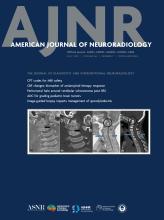Case of the Month
Section Editor: Nicholas Stence, MD
Children's Hospital Colorado, Aurora, CO
December 2014
Next Case of the Month coming January 6 . . .
SMART Syndrome
- SMART: Stroke-like migraine attacks after radiation therapy
- Reversible, recurrent, long-term complication after radiation therapy for brain tumors (mean time interval 20 years)
- Complex migraines with focal neurologic deficits, associated with seizures early in the attack
- Unknown etiology; metabolic, neuronal, and endothelial damage/dysfunction; vascular instability; vasospasm
- Resolves after weeks, in most cases, rarely with persistent deficits but with high rate of recurrence
- Key Diagnostic Features:
- Negative MR examination is possible (findings appear 2–7 days after the onset of symptoms and resolve after few weeks).
- Transient unilateral gyriform abnormal T2 and FLAIR signal with mild mass effect and cortical enhancement with minimal leptomeningeal enhancement, typically in the temporal-parietal-occipital lobes.
- In some cases, cortical laminar necrosis.
- DDx:
- Tumor recurrence
- Prolonged seizure activity
- Subacute cerebral infarction
- Venous thrombosis
- Radiation vasculopathy
- Prolonged complicated migraine
- Familiar hemiplegic migraine
- PRES (Posterior Reversible Encepalopathy Syndrome)
- MELAS (Mitochondrial Encephalomyopathy, Lactic Acidosis, and Stroke-like Episodes)
- Meningo-encephalitis
- Vasculitis
- CADASIL (Cerebral Autosomal Dominant Arteriopathy with Sub-cortical Infarcts and Leukoencephalopathy)
- Rx:
- Anticonvulsant medications











